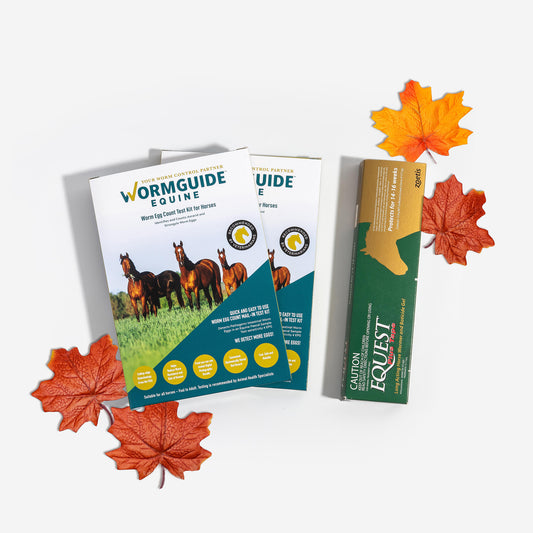There are lots of good reasons to do egg counts, and implementing a worm control program without using them is like driving blindfolded—you simply will not know what you are doing.
Imagine jumping into a car, seat belt on, starting the engine and then pull on a blindfold before driving off into traffic. You`re highly likely to have an accident, you don`t have a clue what you`re doing!

So why do so many horse owners or managers take the same approach when it comes to deworming their horses? -they might as well have a blindfold on.
It should be unnecessary to mention that ignoring the evidence is the most hazardous worm control approach of all.
Nonetheless, this happens routinely in the realm of horse worm control.
But for the past two decades horse research scientists and parasitologists have been sending out the message to stop the 1960`s blind calendar-based deworming strategy and use faecal egg count (FEC) evidence to guide worm control.

The commonly used calendar-based strategy is not only ineffective, it`s also contributing to escalating resistance to our deworming products.
Clearly change has not been fast enough because dewormer resistance is getting worse every year and there are now genuine fears that horse welfare and the viability of horse businesses will be affected by untreatable worm-related disease in horses!.
Prof. Jabbar Professor in Veterinary Parasitology at The University of Mellbourne says that research results indicate - on the current trajectory- it may only be a few years until ALL horse worm species become resistant to ALL deworming products.
OH  !
!
Why learn the hard way?
Many horse owners and managers have already learned the hard way about blindly overusing deworming treatments without using egg counts for evidence of the type of worms present, egg shedding levels and efficacy of the dewormer used.
The Australian Equine Parasitology Advisory Panel supported by AgriFutures Australia and Boehringer Ingelheim Animal Health Australia published a study in 2019 reported horse worms are resistant to all commonly used dewormers in NSW, QLD and VIC.
The researchers also found that the majority of horse owners or managers surveyed in Australia reported using a blind (6-8 week) calendar-based treatment practice and about one-third dewormed horses using a blind every change of season practice, bi-annual or annual practice without faecal egg count (FEC) data.
Help you horse live their best life
There are many perceived barriers towards making positive changes to outdated practices.
But one of the most challenging barriers is the "I`m doing a good enough job already so resistance won`t happen to my horses and property." Why change?
Don`t let yourself be fooled into thinking you know the dewormer you use works. It`s just how our human brain works. It`s called optimistic bias.
Nowadays it`s best practice to ensure you have egg count evidence for what you believe to be the case.
How do worms become resistant?
It should come as no surprise that Mother Nature is not going to give up her horse worms easily.
Horse worms are a moving target because they naturally develop resistance to a deworming drug through genetic changes. Resistant worms survive treatment and continue to breed, passing on their resistance genes to the next generation, resulting in even more resistant worms in your horses and free-living on pasture.
Excessive deworming—that is, unnecessary blanket treatment of all horses on your farm more than twice a year— continues to speed up dewormer resistance.
Once resistance is in worms, it never goes away and you`ve lost the dewormer - it`s never gonna come back.
Cue.. visually appealing image
Told you

But by working together and focusing on modern best practice sustainable use of our limited deworming drugs , we can slow the development of dewormer resistance.
Why is dewormer resistance a health and welfare issue?
The big genuine fear is that worm-related disease in horses is untreatable.
Although up-to-date best practice worm control is trying to prevent that from ever happening but if it does you want to be able to treat your horse and do it safely and effectively with a worming treatment that still kills the worms.
We want to avoid total deworming failures like sheep and goats with no effective treatment for worm-related disease to save their lives.
Sparing you the photos of sheep and goats that couldn`t be saved because of dewormer resistance.
Let`s explore solutions
We are running out of treatment options, and with no new deworming drugs on the horizon, it is vital to decrease the resistance rate and preserve available dewormer classes for horses.
Horse research scientists and parasitologists in Australia and around the world are all working together to provide solutions to a very serious horse welfare problem.
Be the qualified one in your horse`s life
With so much resistance around, Prof. Martin Nielsen world`s foremost expert research scientists and parasitologist says NO ONE – NO ONE can responsibly recommend a dewormer product without evidence it works for your horses on your horse farm.
Be the qualified person and perform the recommended best practice yearly faecal egg count reduction test (FECRT) to get the truth about your chosen dewormer. Does it still kill the worms?
Your horse`s poo is central to their worm control.
The Super Surveillance FEC test informs you about the type of parasitic worm present (ascarid or strongyle) and the level of strongyle egg shedding to develop a worm control plan.
When you receive your horse`s Super Surveillance FEC results before administering a foundation de-worming treatment to all horses once or twice a year (Spring, Autumn or both depending on your local climate) and eggs are present, it`s a great opportunity to follow up with the Truth Teller FEC 10-14 days after treatment for the recommended yearly faecal egg count reduction test (FECRT). Check the efficacy of the dewormer product. Does it kill the worms?
The Truth Teller (FEC) 10-14 days after treatment is the single most important reason nowadays for egg count testing to inform you about the efficacy of the dewormer you are using.
TEST -TREAT- CHECK
Worming failure or success?
Without this information we are fumbling in the dark but with it, we can develop a meaningful and sustainable worm control program and fight resistance.

WormGuiders who have made the move towards the recommended best practice diagnostic - led worm control are very happy. They enjoy avoiding the overuse of chemicals in their horses and having a meaningful and sustainable plan that works to slow resistance for the future health and welfare of their herd or individual horse.
Join the WormGuide herd and get started today!












